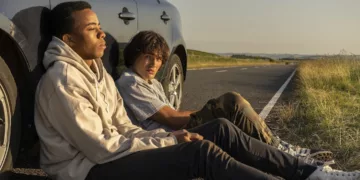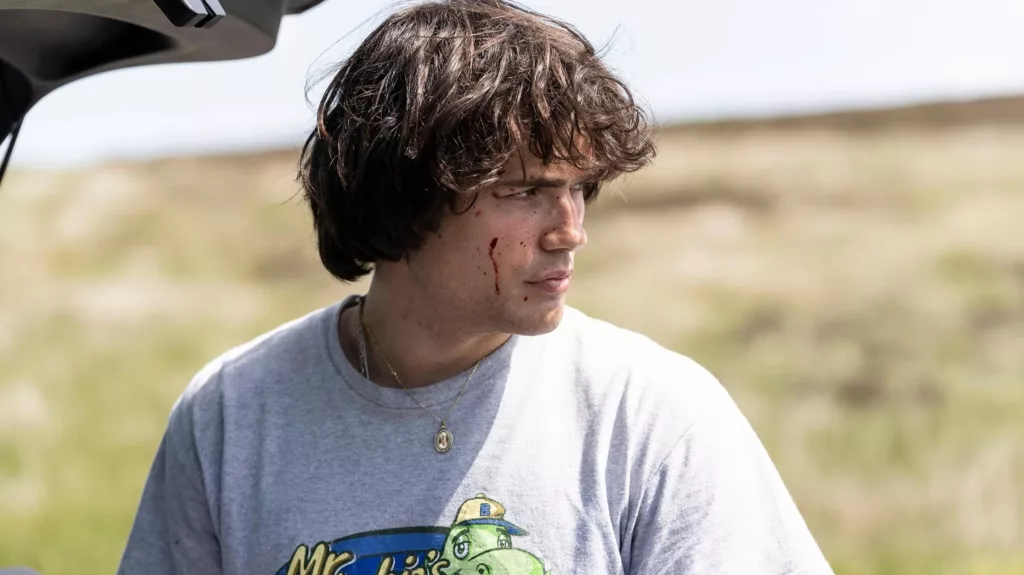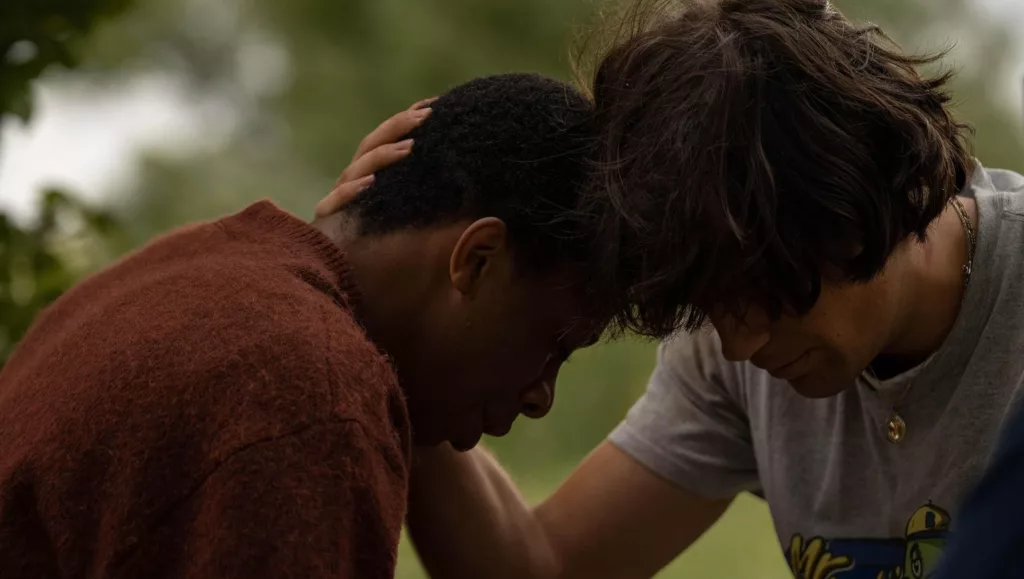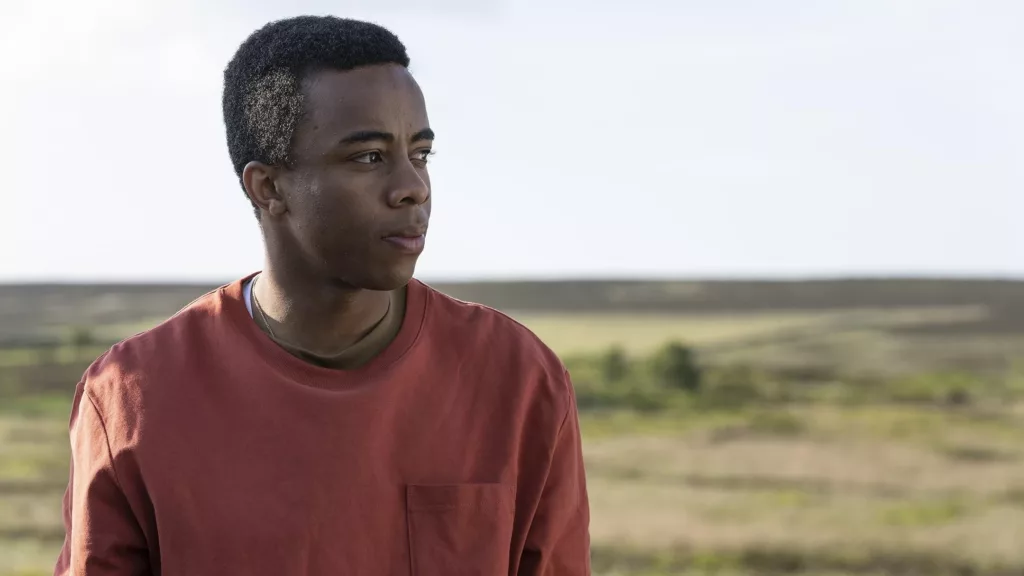In London in the summer, two boys are coming of age. Nathan is hovering on the edge of adulthood as his time in foster care comes to an end. Sam privately deals with pressures no one sees. When a chance encounter on the streets of Brixton brings them together, neither could have known the journey that awaited. But flee the city they do, embarking on a journey of self-discovery through the British countryside in Sam’s little car.
Director George Jaques’ debut feature, Black Dog, is a thoughtful take on the familiar road trip genre. Still a young man himself, Jaques brings an understanding to the characters you don’t always see. Nathan and Sam feel real, with hopes and hurts you recognize. Their bond grows in everyday moments, which many films would rush through. Whether laughing at jokes only they get or facing hard truths in charged silences, you share this ride with them.
Mental health is in both boys’ pasts, though they bear it distinctively. Nathan keeps loneliness at bay with grinning bravado, while Sam quietly carries intimacy in fear. They challenge one another to be more truly seen. As hills and little towns pass outside, their talks chip away pretense to reveal shared brokenness within. When tears come, there’s solace to be found in another’s understanding. Though routes once seemed set, by the journey’s end, nothing is quite what it first appeared.
With empathy and care, Black Dog peeks into youth unfolding. It’s a reminder that beyond labels or differences laid upon us, each person knows their own private struggles. Our shared humanity is what brings us together.
Broken Boys with Hearts of Gold
We meet Nathan just before he cuts ties with the foster system forever. I’m still a kid in many ways, and life hasn’t been easy. Bounced between homes, he longs to find the sister taken from him years ago. But he keeps loneliness at bay with sharp humor and restless energy, always drifting between jobs and friends on rooftops. Deep down, solitude is what he fears most.
Beneath Bravado, you sense pain he’d never show. When a stranger is attacked, Nathan jumps in without a second thought. Helping others is how he copes, even if he won’t admit it. As he packs his meager things on the eve of freedom, you can’t help but wish the world showed this boy more kindness. All he wants is family.
Then there’s Sam, who seems like Nathan’s opposite in every way. Where Nathan is loud, Sam is quiet. He observes the world from behind eyes that see too much. Comfortable surroundings mask the inner turmoil he confronts alone. But his heart remains compassionate—Sam offers Nathan a ride without hesitation.
What begins as polite conversation reveals fissures in each boy’s facade. Sam confesses pressures known only to him as Nathan opens up about life’s harsh lessons. By the trip’s end, they’ll understand one another perfectly, flaws and all, in a way no one else does. Their bond blossoms unexpectedly yet unbreakably.
These broken boys may come from different places, yet in each other they find pieces to mend their souls. As walls crumble on the open road, they challenge one another to heal. Laughter and tears give solace in shared realization—no one needs to fight alone what darkness brings. Ultimately, through accepting life’s beauty even in pain, Nathan and Sam rediscover hope and the power of human love to light our way.
Breaking free of the black dog
Mental health is no stranger in Black Dog, though it tells its story with nuance instead of tropes. For Nathan and Sam, shadows follow where sunlight cannot reach. Internal torments take the form of the “black dog,” a depression that lurks always at the periphery. What sets this film apart is how each boy wears his own mask to hide a pain too intimate to share.
Nathan deflects with bold grins and swaggering steps, plunging headfirst into chaos to distract from silent suffering. Yet beneath Bravado lingers a boy who doubts his worth, believing himself condemned to loneliness. Through it all, he retains a redemptive spirit, fighting for the downtrodden as fiercely as himself. For Sam, masks take on more subtle shapes—shy eyes averted and secrets swallowed till they threaten to drown him whole.
Then comes the road, and the walls between them fall. Two boys from different worlds find solace in each other’s company, as all travelers must. Through laughter and tears, they learn strength dwells not in pretenses but in owning our truths, however unflattering. Their healing begins not with answers but with acceptance—of pains beyond control—and lives theirs to shape anew once shadows recede.
Black Dog disputes easy notions of what makes a man, seeing masculinity as complex and varied as its characters. Its power lies not in the messages but in the in the mysteries it holds for us to unravel, much like these boys’ fates, which twist in surprising ways. Most of all, it reminds us that whatever dark paths we walk, light still awaits—in hopes rekindled, sorrows shared, and human love that lifts our eyes above the black dog’s domain to simpler joys along the road ahead.
Finding Freedom on the Open Road
Not many get their feature film debut at just 22, yet George Jaques pulls it off with care and maturity well beyond his years. Behind the camera, his steady hand guides with a confidence that belies his age. Within close quarters, his lens breathes life into every moment, drawing us deep into Nathan and Sam’s enclosed world on wheels.
Here, the film finds strength, using limits to its advantage. Crowded in that aging compact, tensions rise, yet so does understanding. Silences speak volumes as boys from separate lives open up without escape. It’s a visual metaphor for their growth, beginning hemmed in by walls both literal and figurative.
But Jaques knows just when to expand our view, mirroring the characters’ widening horizons. As miles and memories pass, shot sizes lengthen to sweeping vistas of green countryside. Windows, once fogged by conflict, now frame natural beauty as a as a striking wonder in the jaded urbanites. Through his director’s eyes, we glimpse renewal and a subtle flourishing of hope.
Authentic too are myriad glimpses capturing everyday Britain—run-down garages and packs of crisps snatched mid-journey. Gritty realism anchors fantastical elements in trustworthy soil. It’s a keen artistic choice, affirming Black Dog’s central message that light exists, however hidden, in life’s simplest observed truths and unlikely companionships along the road.
In Jaques, raw talent meets refined technique and sharp artistic instincts. Under his guidance, Black Dog blooms with the promise of greater works to come from a young visionary surely just beginning his journey.
Breaking through Barriers
These are not ordinary road trip partners. Keenan Munn-Francis brings a beautiful fragility to Sam, carefully peeling back layers to show the depths within. Far from your average shy boy, demons haunt with merciless claws. Yet where some see weakness, here lies strength—facing fears unknown to most at such an age with courage beyond surface reserve.
Opposite stands Jamie Flatters’ vibrant Nathan, all fire and fury masking melancholy roots. His acting owns each outburst, infusing raw passion that grips. Yet compassion emerges too, seeing in Sam what few notice or care to. Between these two black dogs, an unlooked-for bond blossoms, healing what was harmed alone.
Together, an alchemy occurs, making such chemistry impossible to feign. Their interplay feels so genuinely lived-in that one can’t help but forget the fiction framing lives laid bare. Through every quip and quiet moment, an unguarded intimacy draws us near; we know these souls like old friends rediscovered. And though they depart, their gifts of empathy and understanding stay forever with us all.
Breaking barriers, they show that under skins, unlike our own, heartbeats are kindred as one’s own. With vulnerability and vigor in equal measure, Flatters and Munn-Francis illuminate all that unites across difference—the fraternity found facing fear. Hers is a masterclass in silence and the power within, in giving voice to long-hushed hopes. Theirs is a partnership for the ages, breathing new life into a genre and all who witness their triumph over stigma, transcending labels, and bringing us simply human truth.
Room for growth
Black Dog leaves you mulling on its boys’ journey long after. Yet for all its moments of poignancy, certain aspects ring slightly off-key. Sam and Nathan’s exchanges at times tread a line too far between telling and showing. Through the glass dimly, we see their truths, where breathing space might let feelings flow fresher.
The film works best by granting its characters’ autonomy and letting us learn about them through what’s left unsaid. But elsewhere, a tightening reins perception, with summaries substituting for silences that speak volumes. We grasp the basic beats, yet the finer shadings feel filtered too coarsely. When space opens up, allowing the raw to shine through, the rewards grow richer—as down windy strands, their feet stray near entanglements barely broached before breezing past.
In storytelling, less proves most. And here, less explanation might strengthen what already moves. But these quibbles should not distract from large loves warranting praise. Chief among the leads’ vibrantly felt performances—Munn-Francis especially—transports us deep within torments rarely shown with such searing empathy. Their bond, too, grips by way of hard-won compassion flowing from fissures in fellow feelings we all share.
Any work leaving scope for growth remains one sure to. In stretching to consider darkness intimate yet rarely voiced, Black Dog brings luminance that lasts. May its creators keep walking paths where few yet tread, expanding vistas they’ve shown how to render anew with care, courage, and nuance’s subtle nail often left better untapped save when absolutely needed to let beauty beam through.
The road less traveled
Black Dog takes a thoughtful path, exploring its characters. At its heart lies an empathetic character study, offering a glimpse into lives rarely seen with such care. While not entirely avoiding tropes, the film breathes authenticity into depicting Nathan and Sam’s struggles in a moving, nuanced light.
Difficult themes are handled here with subtlety rather than sensation. We observe how the boys’ journey opens windows into private pains seldom shared and see walls between them crumble as they offer one another understanding in a world not always so kind. Though the film has its imperfections, one remains struck by its leads’ deeply felt portrayals, bringing these souls’ interior terrains to light.
Moments when interactions feel stilted leave deeper imprints on those where humane exchange flows freely. For it is in shutting out cursory satisfaction that we find truths demanding our attention. Herein lies a quality awakening viewers to fellowship across perceived differences, reminding them that under surface variances, shared fragilities unite us far more than any accident of status can divide.
While not a flawless work, Black Dog’s strengths make it a film worthy of appreciation. It bids us to see beyond the surface to the whole of who another is and recognize in lives most unlike our own echoes of a shared creaturehood deserving compassion. In spotlighting hopes, fears, and brave steps towards healing so privately wrestled with, it leaves one thoughtful and hopeful that through works like this, understanding between all people may continue growing in this world.
The Review
Black Dog
Black Dog shows promise in its empathy-driven character study, bringing nuanced light to personal struggles too often shunted to the shadows. Though not perfect in execution, the film resonates through astutely emotional performances that burrow beneath superficial variances to reveal shared fragility at our core. It invites viewers past initial impressions to recognize reflective echoes of our common humanity in lives most different from our own. For tackling its challenging themes with such care and opening thoughtful dialogue, Black Dog deserves appreciative viewers.
PROS
- Empathetic and nuanced exploration of its characters' mental health struggles
- Powerful and emotionally gripping performances by the leads
- Authentically handles difficult themes with care and subtlety
- Encourages understanding between people of different backgrounds
CONS
- Some plot points and character details feel underdeveloped
- Occasional stilted dialogue that breaks immersion
- Tonal shifts now and then feel abrupt or heavy-handed






















































Discussion about this post